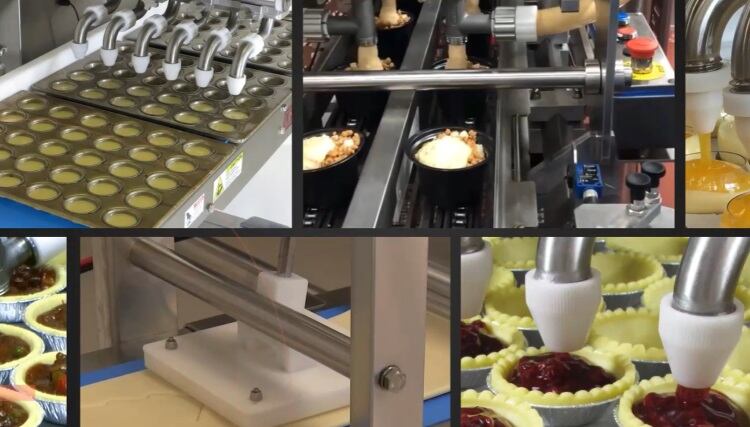Many small to mid-sized bakeries have been forced out of their comfort zones to adapt their business model to comply with public health restrictions. One of the most significant transformations of the industry has been the surge in businesses adopting automation to help streamline operations and ensure business continuity.
Outside of COVID-19’s context of survival, automation presents an excellent opportunity for growth for both businesses that seek a competitive edge and the industry as a whole.
According to Unifiller Systems, there are several ways in which automation is propelling the bakery industry forward.
- Productivity: The number one benefit of adopting automation is the increased level of productivity. Regarding processing lines, automated systems don’t tire; they create higher and more consistent output compared to human workers.
- Tighter quality control: Leveraging automated production lines and equipment would offer a practical solution to the problem of human error. Despite best efforts, workers may tire, burn out, get distracted or simply lack consistency in their work – especially if their tasks are repetitive. Machines, on the other hand, can be programmed to always meet specific and repetitive product parameters.
- Assist with data collection: Regulatory requirements make food traceability an important criterion for businesses to consider. Data collection becomes more precise and easier to track with computer technology, which would be helpful in the case of employee injury, product recalls, or any other issues that may come up.
- Flexibility and versatility: Automated equipment can be built to be mobile, which makes it easier to optimize a small production space. For example, depositors and robots have been used in small to mid-sized bakeries to maximise throughput. Site manufacturers would be able to move equipment around and fit more machines in an otherwise tight space. Automated machines are also highly adaptable, enabling them to be adjusted for different uses and products.
Robotic helpers
Collaborative or secondary processing operations are starting to see robotics and automation, where a specific automated process helps improve overall efficiency, standardises processes, and reduces the amount of waste. For example, cutting, counting, or mixing are straightforward and repeatable applications that can easily be improved with automation.
Main robotic applications that are nowadays standard in the food sector are in material handling and packaging operations. The improvements in a robot’s ‘gripping’ mostly with some type of vacuum assistance has streamlined the technology. Other advancements in robotics include a priority for versatile designs.
“Before, we saw large stationary machines; now with automation and robotics, we see small, modular machines that do specific processes. This adds versatility as companies can focus on one pain point and use technology to solve an issue,” said Miguel Lutz, territory manager at Unifiller Systems.
Modular designs are ontrend
As the pandemic stretches on and consumers demand more variety in snack foods, it becomes necessary for equipment to handle production in a more flexible way.
“Unifiller offers very popular semi-automated solutions that allow bakeries to produce a much wider range of products in a single production line,” said Mauricio Nahum, international applications manager at Unifiller.
“With our modular design approach, you can produce a range of products during a peak holiday season, for example, and then re-purpose your equipment with new tooling to produce different products as demand and business opportunities arise.”
This can be a very cost-effective way to automate production for bakeries or central commissaries who may not have large enough volumes to justify investing in multiple dedicated lines for each kind of product.
From pneumatic to servo
Within the realm of automated food processing, Unifiller said it has seen the rising popularity of servo-driven machines with programmable logic controllers (PLC). The addition of these technologies helps companies save and repeat processes, gain speed, reduce changeup time, and improve product consistency.
“Volumetric piston depositors were and are still often based on pneumatic technology, which incorporate significant limitations in automated solutions. The unique line of Unifiller servo depositors is the ultimate answer for automated solutions,” said Steven Belyea, applications manager at Unifiller Systems.
“With computer controls that include an operator-friendly touch screen and storage for 100 recipes, the setup when switching to another product is reduced dramatically with more than thirty parameters stored in each recipe. Servo-based depositors are also not affected by fluctuating air pressure from the compressed air system and are therefore able to give the most consistent and repeatable depositing solutions.”
In addition to benefits like recipe storage and higher output, servo-driven machines offer the opportunity for sites to integrate various processes and systems. The advantage of system integration – using software – is that site operators can access and manage the whole line at the touch of a button and standardize processes. For example, a cake decorating system from Unifiller easily integrates with a cardboard placement system or cake slicing system to optimise cake production. On the prebake side, bakeries could save energy by integrating a depositing line with conveyors, ovens, and freezers.
Automation is an exciting area of technology that continues to evolve and provide lucrative opportunities. As innovations are spurred on by the pandemic and as these technologies improve, the bakery industry improves along with them – perhaps that is the silver lining amidst the chaos.


